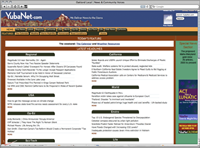 NEVADA CITY, CALIFORNIA — “The legacy media don’t see this area as a market,” says Pascale Fusshoeller, editor and co-founder of YubaNet in Nevada City, California.
NEVADA CITY, CALIFORNIA — “The legacy media don’t see this area as a market,” says Pascale Fusshoeller, editor and co-founder of YubaNet in Nevada City, California.
When looking at a map of the Sierra Nevada, one can understand why. The Range of Light, as John Muir described it, stretches 400 sparsely populated miles along California’s Central Valley, containing the country’s natural shrines of Yosemite, Lake Tahoe, and Sequoia.
- Read more about Yubanet
-
“The geography of the landscape directly reflects the media landscape,” says Fusshoeller. “Very fragmented. Isolated.”
Noticing the decline of newspaper coverage and the marginalization of several communities by bigger publications, Fusshoeller, who previously worked in the television department of Europe’s Radio Tele Luxembourg, and Susan Levitz, former marketing manager for a San Francisco French-language newspaper, created a public platform for non-profit organizations to share information about their causes. Ironically, it would be California’s biggest threat to the Sierra–fire–that would spread YubaNet across the state and broaden its platform into one of the region’s most-read online news sources.
On Oct. 16, 1999, the day YubaNet went live, Fusshoeller and Levitz noticed distant smoke from their home office hilltop view. After calling the Forest Service for details, they asked for permission to announce the fire on their website, and got the okay. Because the fire was initially outside the local coverage area for outlets like The Union in Grass Valley, YubaNet was the first to report it.
Someone at local radio station KVMR saw the story, and began to refer listeners to YubaNet’s coverage of the Pendola fire, which burned over 11,000 acres in just nine days. “And that was when traffic went off,” says Fesshoeller. The Pendola fire revealed an information gap that YubaNet continues to fill, at the same time that hard news coverage from “dead tree media,” as Fusshoeller calls them, has declined.
“Fire news is the gateway drug to get a lot of readers to YubaNet,” says Fusshoeller, who monitors the site’s nation-wide fire map. In recognition of valuable wildfire and air quality coverage, Fusshoeller was selected among the first online health journalists to join the USC Annenberg Health Journalism Fellowship in 2011.
Beyond its public service function, YubaNet, whose banner proclaims “We Deliver News to the Sierra,” is now a thriving outlet with over 150,000 unique monthly visitors and 23,000 weekly newsletter subscribers.
Six days a week, Levitz and Fusshoeller, the only full-time staff members, edit and publish about a dozen originally reported articles per day, including citizen-contributed material on regional news and opinions, in addition to twenty aggregated stories or news releases from wire services. They have help from about thirty to forty regular contributors, some of whom are paid.
YubaNet’s content ranges from regional to world news headlines, and it ranges in style from op-eds and political cartoons to a weekly astronomy outlook from Jim Kaler, professor emeritus at the University of Illinois. The latest headlines are categorized and blocked out on the homepage in columns, without flashy multimedia, beneath a simple banner graphic of a mountain range.
The site’s five-part special report and ongoing op-eds concerning the controversial proposal to re-open the Grass Valley gold mine prove that this outlet isn’t just a passive source; it can actively engage community issues. And its claim of “doing ‘citizen journalism’ before the term was coined” is backed up today by the way it allows readers to submit articles via email and openly post to a community event calendar.
Advertising supports the site, with 15 to 20 percent of ad revenue coming from local advertisers. The remainder is split between Google Ads and the Sacramento Local Online Ad Network (SLOAN). Depending on the year’s traffic, Fushoeller says, annual revenue ranges between $50,000 and $100,000, which is enough to pay the bills and at least ten of their regular columnists.
As Fusshoeller looks to the future, she considers hiring someone to assist the daily workflow, as she often has to drive for several hours in the Sierra to cover government meetings. Regardless of its expansion, YubaNet is dedicated to providing relevant content that thousands of Californians find nowhere else.
“The legacy media see us in the Sierra Nevada as either the conservative old-timers or the liberal new-comers,” says Fusshoeller. “I say we have something in common: we all made a choice to live here. YubaNet latched on to that sense of community, rather than further dividing the population up.”
-
Yubanet Data
Name: Yubanet
URL: yubanet.com
City: Nevada City
Tyler Jones is a contributor to CJR.
